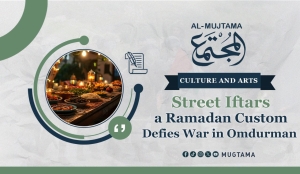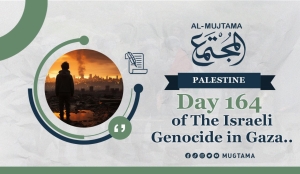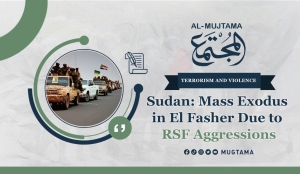Street Iftars a Ramadan Custom Defies War in Omdurman
March 19, 2024Open Ramadan iftars within the streets of towns and neighborhoods had been intently connected emotionally to social life in Sudan, and over the years and eras they become a deeply rooted social way of life to the extent that it marked the country wide individual of the Sudanese and have become a name that distinguishes them among the peoples of the sector, and a completely essential cost of their religious and social background.
But the continuing struggle seeing that final April, and the catastrophic harm it triggered to the capital, Khartoum, and its citizens, threatened the probabilities of this social subculture continuing this year.
The idea in the back of open street iftars is to acquire the values of interdependence, unity and equality amongst people, via sharing the Ramadan desk on the time of iftar a number of the friends of the identical neighborhood and their capability visitors and passers-by using. The commonplace Ramadan desk includes all segments of society and its social training on an same footing.
Secretions of conflict
Among the tragic variations of the war waged with the aid of the Sudanese military in opposition to the Rapid Support Forces is that loads of thousands of Sudanese families had been tormented by “transient poverty.” After armed robbers stole their property and financial savings and compelled them to go away their homes into the unknown.
The battle, which is about to complete its first 12 months, paralyzed many essential sectors, threatened the lives of individuals, and triggered a large wave of displacement from Khartoum (greater than 7 million humans) who were pressured to depart their homes to different Sudanese towns, and the population of the capital and its 3 towns shrank to approximately 3 million humans.
Those who insisted on staying in Khartoum and refused to depart, lived between the two aspects of a dangerous and extraordinarily fragile protection situation, disturbed by the sounds of bullets, cannons and cell battles, and the weight of the crushing financial disaster.
In mild of this modern truth, it became broadly expected that the open Ramadan table would be the first casualty of the war, but that did not manifest.
Reducing the impact of battle
In the ancient neighborhood of Al-Hatana in Omdurman, Al Jazeera Net monitored the human beings’ celebration of all the ceremonies associated with the collective iftar from the first day at their known timings, starting with cleansing the region, spreading the carpets, and spraying the vicinity’s surroundings with water, then casting off the meals utensils, iced drinks, tea and coffee.
Ramadan tables left houses and took to the streets at their common time, as if nothing had took place. As if all of the fears, demanding situations, difficulties and risks meant nothing, and as though the acute excessive costs, the tightness of price range, and the risks of gathering in a place of energetic army operations had no effect, in change for the Sudanese satisfying their pledge and putting forward their commitment to their most critical non secular and social traditions at some point of Ramadan.
The elements related to communal iftars are the same as what took place in each neighborhood of the town and every year, and that they did now not fluctuate a good deal. However, the size and level of the Khartoum table this 12 months, in addition to the content and nature of the accompanying Samar human beings, have been hostage to the warfare and its profound consequences.
Combined efforts led to supplying an appropriate conditions to restore this core Sudanese subculture, ensuring its stability and protective it from extinction amid the storms of security and economic turmoil attributable to the war.
Food aid centers
Othman Al-Jundi is a younger journalist and activist inside the subject of humanitarian work. After the outbreak of the struggle, he committed his efforts to offering meals and clinical assist to the people of the troubled metropolis who insisted on staying there, or who located themselves caught among the lines of fire without economic resources to assist them get out to more secure areas.
Al-Jundi told Al-Jazeera Net that the humanitarian support companies devoted their efforts to filling the gaps and allowing the Sudanese to carry out their duties inside the way and shape that they inherited from their ancestors and lived by using at some point of their lives, in cooperation with supporters in governmental and private institutions and businessmen.
The committed efforts undertaken via Othman and his team, along side different crews, installed food resource facilities in the three cities of Khartoum have borne fruit, as they have got given the residents of the Sudanese capital a complete Ramadan experience no matter the tyranny of war and the pressures of living.
Naturally, there had been differences in length, stage, or even in the preferred temper, however the experience of this excellent 12 months will stay immortal for decades and a source of renewed suggestion, after the Sudanese flip the web page on the warfare and resume their everyday lives.
Source: Al Jazeera
Day 164 of the Israeli Genocidal War on Gaza
March 19, 2024Fighting and humanitarian crisis
- Israeli forces stormed Gaza’s al-Shifa Hospital, with a military spokesman claiming Hamas fighters have regrouped inside the medical facility.
- Gaza’s Ministry of Health said the raid on the hospital – Israel’s fourth since October – has resulted in deaths and injuries.
- According to Gaza’s Health Ministry, some 30,000 people – including displaced civilians, wounded patients, and medical staff – are trapped inside the hospital amid Israel’s onslaught.
- Separately, Israeli Prime Minister Benjamin Netanyahu has pledged to go ahead with a ground assault on Rafah in Gaza after German Chancellor Olaf Scholz warned against it.
Aids after Months!
- In Gaza, 19 aid trucks arrived safely in Jabalia as the first convoys to travel from the south to the north of the Gaza Strip without incident in four months bring desperately needed aid.
More than 31,600 Innocent people Killed
- Israel’s air and ground campaign since October has killed more than 31,600 people, Gaza health authorities said. It has also driven most of the population from their homes, and brought people to the brink of famine, aid agencies added.
Diplomacy and regional tensions
- The Islamic Resistance in Iraq, a coalition of pro-Iran armed groups, has said it launched a drone attack at an Israeli airbase in the occupied Golan Heights.
- Meanwhile, the Jordanian army has announced detecting suspicious aerial movements from an unknown source along the border with Syria, according to the Reuters news agency.
- German Chancellor Olaf Scholz warned Israel’s Netanyahu on Sunday against his plans for a ground offensive in Rafah, while EU Commission President Ursula von der Leyen echoed his sentiments during a visit to Cairo.
Aggressions in the occupied West Bank
- The Wafa news agency is reporting that Israeli forces detained at least 25 Palestinians in the occupied West Bank on Sunday, including a woman from Gaza, a child and former prisoners.
- The woman from Gaza has cancer and was arrested as she was heading to Jerusalem to complete her treatment, the agency said, citing a joint statement from the Palestinian Prisoner’s Society and the Commission of Detainees and Ex-Detainees.
Sudan: Mass Exodus in El Fasher Due to RSF Aggressions
February 19, 2024Renewed Clashes
Recently, there has been a lot of fighting in El Fasher, a city in western Sudan. The Sudanese army and the Rapid Support Forces have been fighting each other, causing a lot of people to leave their homes.
Displacement
The International Organization for Migration reported that many families had to leave their homes and seek shelter in other parts of the city. The exact number of people who have been displaced is still unknown, and the situation is very tense and uncertain.
Rapid Support Forces Control
Over the past few months, the Rapid Support Forces have taken control of the capitals of four out of five states in the Darfur region. This has made the situation even more complicated and dangerous for the people living there.
Humanitarian Crisis
The United Nations Office for Humanitarian Affairs stated that over 8 million Sudanese people have been forced to leave their homes, both within the country and to neighboring countries, since the fighting began in mid-April 2023. This has created one of the biggest displacement crises in the world.
Children Affected
It is especially heartbreaking that 4 million children are among those who have been displaced. This has created the largest child displacement crisis in the world, and it is important that we do everything we can to help these children and their families.
Humanitarian Support Needed
It is clear that Sudan is facing a major crisis, with millions of people in need of assistance and support. The United Nations has reported that more than 25 million people, including over 14 million children, require help to survive and rebuild their lives.
Devastating Impact
The war between the Sudanese army and the Rapid Support Forces has already resulted in over 13,000 deaths, according to the United Nations. It is crucial that we work together to bring an end to this violence and provide aid to those who have been affected.
Source: Anadolu Agency





